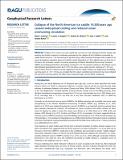Collapse of the North American ice saddle 14,500 years ago caused widespread cooling and reduced ocean overturning circulation
Abstract
Collapse of ice sheets can cause significant sea-level rise and widespread climate change. We examine the climatic response to meltwater generated by the collapse of the Cordilleran-Laurentide ice saddle (North America) ~14.5 thousand years ago (ka) using a high-resolution drainage model coupled to an ocean-atmosphere-vegetation general circulation model. Equivalent to 7.26 m global mean sea-level rise in 340 years, the meltwater caused a 6 sverdrup weakening of Atlantic Meridional Overturning Circulation (AMOC) and widespread Northern Hemisphere cooling of 1-5 °C. The greatest cooling is in the Atlantic-sector high latitudes during Boreal winter (by 5-10 °C), but there is also strong summer warming of 1-3 °C over eastern North America. Following recent suggestions that the saddle collapse was triggered by the Bølling warming event ~14.7-14.5 ka, we conclude that this robust submillennial mechanism may have initiated the end of the warming and/or the Older Dryas cooling through a forced AMOC weakening.
Citation
Ivanovic , R F , Gregoire , L J , Wickert , A D , Valdes , P J & Burke , A 2017 , ' Collapse of the North American ice saddle 14,500 years ago caused widespread cooling and reduced ocean overturning circulation ' , Geophysical Research Letters , vol. 44 , no. 1 , pp. 383-392 . https://doi.org/10.1002/2016GL071849
Publication
Geophysical Research Letters
Status
Peer reviewed
ISSN
1944-8007Type
Journal article
Description
RFI is funded by NERC grant #NE/K008536/1. Numerical climate model simulations made use of the N8 HPC Centre of Excellence (N8 consortium and EPSRC Grant #EP/K000225/1).Collections
Items in the St Andrews Research Repository are protected by copyright, with all rights reserved, unless otherwise indicated.

